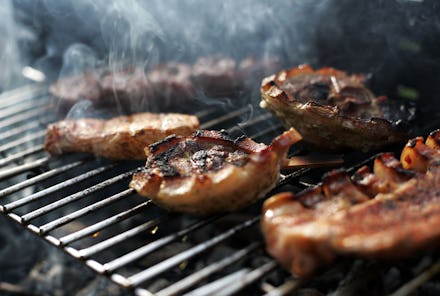Scientists Say You Should Stop Using Your Charcoal Grill Immediately

As you spread blackened lumps of coal onto your fire pit, your mind wanders to thoughts of beach volleyball, outdoor movies and barbecued freedom. Unfortunately, grilling with charcoal comes with a hefty environmental cost: heavy greenhouse gas emissions.
Charcoal nuggets, or briquettes, are essentially tightly packed bundles of carbon. When they're burned, they spew pounds of the greenhouse gas carbon dioxide into the atmosphere.
Swiss researcher Eric Johnson compared the environmental impacts of cooking with gas and charcoal in a 2009 study. While cooking with charcoal emits up to 11 pounds of carbon dioxide per grill session into the environment, for example, grilling with propane emits just 5.6. To put that in perspective, one session of grilling with propane, he found, emitted enough carbon dioxide to drive a small car 8 miles. Cooking with charcoal, on the other hand, put out enough CO2 to drive the same car a whopping 22 miles.
Image Credit: Eric Johnson, Atlantic Consulting
What is charcoal anyway? Charcoal is made when manufacturers cook wood in a low-oxygen environment to remove water and any other unwanted substances. But despite being super-concentrated, the process of cooking with charcoal is far from efficient. Unlike propane, which you turn on when you start cooking and shut off when you're done, charcoal gives off massive amounts of heat before and after you're finished the actual cooking. Additionally, charcoal briquettes tend to be used for a lot of "low-and-slow" barbecue, meaning they're burned for longer periods of time than gas, emitting even more CO2 into the atmosphere.
But it's not entirely bad. Other research has suggested that despite its hefty carbon footprint, charcoal could still have some environmental benefits because, unlike propane, it's not a fossil fuel. Since charcoal comes from wood, an ostensibly renewable resource, lumber companies could make up for grilling emissions by replanting the trees they fell. Not all companies are environmentally sustainable, however, as proved by the fact that deforestation continues to make up a sizeable chunk of all human-caused carbon emissions.
Image Credit: Getty
Why it matters: Summer grilling is nowhere near as carbon-intensive as, say, the number of airplane trips you take each year or the type of car you drive. But these little choices can add up. So this Fourth of July, instead of firing up a charcoal grill, you might want to consider going with gas.